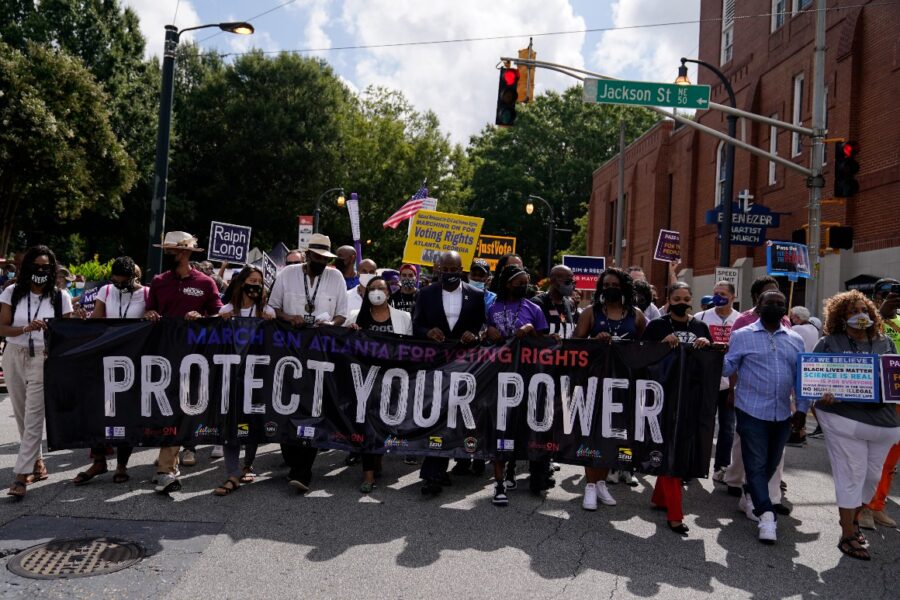GOP takes aim at the engine that turned Georgia blue

First came passage of one of the nation’s most restrictive voting bills. Then came efforts to overhaul the number of elected offices in one of Georgia’s largest counties.
Now, with the pending passage of a new congressional map, Republicans have taken another step toward dismantling the Atlanta-area engine that turned Georgia blue, powering President Joe Biden to victory in 2020 and flipping control of the Senate to Democrats.
Just as Georgia has emerged as a pivotal swing state, the GOP-controlled legislature has gone to extraordinary lengths to overhaul election administration, rewrite election rules and redraw political lines in the fast-growing metro region that is currently reshaping state politics.
The changes stand to roll back many of the recent Democratic Party’s gains or dilute Democratic power. And with a high-stakes Senate race, a governor’s race and several competitive House races in 2022, they could have implications that reach well beyond Georgia’s borders.
“We’re getting hit from every angle,” said Dontaye Carter, a former spokesperson for the Fulton County district attorney and also a 2021 mayoral candidate in Sandy Springs, Ga., less than 20 miles north of Atlanta. “We’re fighting against it. But the reality is we just don’t have the political capital or the resources to make an impact.”

Sweeping demographic changes and historic Black turnout in Metro Atlanta’s four largest counties — Fulton, Gwinnett, Cobb and DeKalb — have sent shockwaves through Georgia politics in recent years, flipping two House seats to Democrats in the last two election cycles, sending Raphael Warnock and Jon Ossoff to the Senate in January and making Biden the first Democratic presidential nominee in a quarter-century to win the state.
The newly redrawn congressional map — which is currently awaiting GOP Gov. Brian Kemp’s signature — is likely to erase one of those House gains. By splicing Cobb County, a one-time Republican stronghold that has trended Democratic in recent years, into four congressional districts, Republicans managed to dilute the county’s Democratic votes and force Democratic Reps. Carolyn Bordeaux and Lucy McBath to run against each other.
“‘One person, one vote’ is eroded…the way [Republicans] have done cracking in this map is with laser precision,” said state Rep. Erick Allen, who chairs the Cobb County delegation in the statehouse and is running for lieutenant governor. “I mean, they have broken communities of interests’ voices and diluted their political voice a tremendous amount.”
People of color are on track to become a majority of the population soon in Gwinnett, one of the fastest-growing counties in the state. Like Cobb County, it’s moved leftward as it’s become more diverse. Last year, Democrats flipped a majority of Gwinnett County offices, capturing control of the county commission and school board while winning the county sheriff and district attorney offices. All of the leadership posts in those offices and boards are now occupied by Black politicians.
In early November, however, Republicans in the state Senate set in motion legislation that could roll back those gains by doubling the number of members on the county commission and making its school board nonpartisan.
The practical effect would be to dilute Democratic power at the moment the party has taken control. Even with newly installed Democratic majorities on both boards, their decisions will require buy-in from new members who would likely represent largely white and Republican areas if the number of seats were expanded.
“We’re seeing this alarming trend of Republicans trying to usurp local control,” said state Rep. Bee Nguyen, who is running for secretary of state next year. “They know that, in Gwinnett, it’s going to be hard to have any kind of Republican control there. And so they’re using other mechanisms to try and regain the control that they’ve lost.”
Those aren’t the only regional constraints under discussion.
Under Georgia’s restrictive new voting law, the state can disband a local election administration office and replace it with a state-appointed superintendent. The state’s power to do so is limited — the law only allows election boards in four counties at a time to be disbanded. But if those four counties were Fulton, Gwinnett, Cobb and DeKalb, it could wreak havoc on Democratic prospects because Republicans would have the power to challenge election results, hold up certification and announce investigations in the counties that produce the bulk of Democratic votes.
In Atlanta’s Fulton County, a Republican-initiated election review panel has already been formed to look for evidence of unresolved errors or a breach of election law in a county’s election oversight since 2018.
Georgia Republicans have dismissed Democrats’ claims that any of their actions are motivated by racial or partisan considerations. Clint Dixon, the Gwinnett-based Republican state senator who is the lead sponsor of the two bills that would change the county commission’s size and make the school board nonpartisan, said the idea was “just false.”
“It’s about our kids,” he said. “They’ve already been through a rough patch with the pandemic, and many of them have fallen behind because of virtual learning. And, you know, we need to move on that. We need to … get them back on track and just focus on kids and protecting children. That’s simply what it is.”
Dixon said he plans to broaden the school board legislation when it will be revisited during the January legislative session to make it a statewide policy that would make all county school boards nonpartisan. He called it “the first step in getting politics out of our school system.”
But the timing of the bills — less than a year after Democrats took majorities on the county commission and school board while the latter elected its first Black chair — is suspect.
“As soon as we elected all people of color to the Gwinnett County Commission, and have a majority of people of color leading the school board, we see efforts introduced to immediately strip people of color from positions of power, strip their power,” said state Rep. Sam Park, who chairs the Gwinnett County delegation in the legislature.
Metro Atlanta Democrats also remain leery of as-yet-unknown implications of other provisions in the state’s new voting rights law. Those provisions include limits on the number of drop boxes in counties, a shortened absentee voting schedule and more stringent voter ID requirements — all of which could have a disproportionate impact in the four counties.
“I think we were made vulnerable with what happened with the dismantling of the voting rights, and all of those things have been smaller, kind of like death by 1,000 cuts,” said Latosha Brown, co-founder of the organization Black Voters Matter, which aims to mobilize and turn out Black voters across the South. “At the end of the day, I think there’s a fundamental question around, ‘Is democracy going to be protected and expanded in this country?’ I think Georgia is a microcosm of what we’re seeing happening all around the country.”
Democratic officials note that the proliferation of legislative action is a reminder of the precariousness of their recent gains. Despite the party’s victories atop the ballot, the inability to break the GOP’s hold on the statehouse threatens to unravel it all.
“Everyone was celebrating Georgia going blue last year. And I was just kind of like, ‘Oh, no, we did not win the state Legislature. We’re in trouble,’” said John Jackson, chair of the DeKalb County Democrats. “Democrats really haven’t registered in our minds how important the state legislature is, and why we need to have a better emphasis on winning the state legislatures. Republicans have stacked the cards in their favor.”
Go To Source
Author: POLITICO

